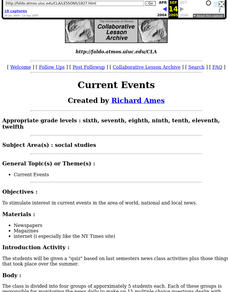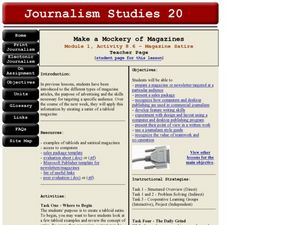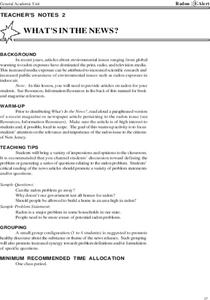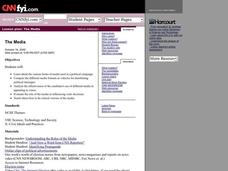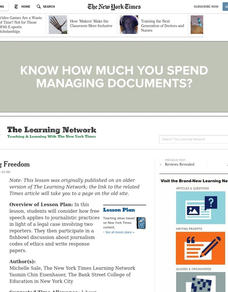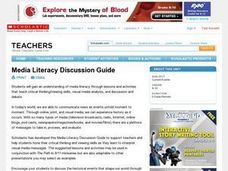Academy of American Poets
Teach This Poem: “Making History” by Marilyn Nelson
What makes an event newsworthy, worth a reference in a news magazine or textbook? Who decides? These are questions Marilyn Nelson asks readers of her poem "Making History" to consider. To begin, class members list details they notice in...
Curated OER
Comparing News Sources: Where Would You Turn?
High schoolers follow the study of Ray Bradbury's Fahrenheit 451 and attempts to connect the thematic underpinnings of the novel to Students' own lives.
Curated OER
Mr.Bubble's News
Second graders use a double bubble thinking map to compare newspapers and magazines. They browse through magazines and newspapers to identify characteristics of each type of text and find 5 features for each type of text. They share...
Curated OER
What's in the News?
In this analysing articles worksheet, students read two newspaper articles about the issue of radon and answer six questions that allow students to reflect on how the articles were written and what is left unknown to the readers.
Newseum
Editorials and Opinion Articles
Reading the news is fun, and that's a fact! With the lesson plan, scholars differentiate between fact and opinion as they read editorial articles. They complete a worksheet to analyze the information before writing their own editorials...
Curated OER
What's New in the News?
Students explore the news. They research Internet news sites, newspapers, and magazines and select four areas to summarize. They simulate a news announcer by summarizing the news and including supporting details for a particular day.
Curated OER
Getting the Word Out: From Gutenberg's Press to Zines
Young scholars examine the effects of Gutenberg's printing press on the world. Using this information, they create their own Zines or internet magazines about a social issue of their choice. They share their magazine with the class for...
Curated OER
Archaeology In The News
Students investigate the different articles of archaeology that is found in a variety of research and news resources. They read one of the selections and complete the worksheet as a guide to writing a summary of the article. Students...
Curated OER
Electronic Media
Students compare forms of electronic media. They watch a news broadcast and take notes on the content being conveyed. After viewing the broadcast, they read newspaper articles or news magazines to locate articles with similar content to...
Curated OER
Combing Through the News
Students use the Sean 'Puffy' Combs trial to compare how and why various media cover a news story differently.
Curated OER
Current Events
Here is an ongoing activity intended to build interest in local, national, and world news. The class is divided into four groups of approximately five young scholars each. The groups are responsible for monitoring the daily news. They...
Curated OER
Make a Mockery of Magazines
Students examine tabloids. In this journalism lesson, students compare and contrast satirical magazines and then plan, write, and compile their own.
Curated OER
What's in the News?
Young scholars discuss any news article or video about the environment. They develop their own questions relating to radon and how it effects people and the environment. They answer each others questions to end the lesson.
Curated OER
Using a Graphic Organizer to Critically Observe Televised News Broadcasts
Students compare two television news broadcasts. They discuss how to organize information when comparing two objects and read and discuss two books to create a Venn diagram to compare both books. After creating the diagram, they view...
Curated OER
Video Game Violence: Explore Possible Impacts
Introduce middle schoolers to the issue of video game violence with a multifaceted approach. Learners complete a gaming survey, as well as read and discuss a news feature about violent video game sales and a handout on stimulus...
Curated OER
Eisenhower: The Cold War
Students participate in a news conference simulation. In this Cold War activity, students research events of the conflict during Eisenhower's presidency and use the information to script and participate in a news conference with Eisenhower.
Curated OER
The Media
Students identify various forms of media used in a political campaign and compare the different formats as vehicles for distributing political messages. They analyze the effectiveness of candidate's uses of different media.
Newseum
Persuasion Portfolios
After class members brainstorm a list of current social and political issues, groups each select a different topic from the list to research. Teams create a portfolio of at least 10 examples of stories about their issue, stories that...
Curated OER
What's the News?
Middle schoolers investigate current events. In this current events lesson plan, students identify current events from newspaper articles and place them on a timeline.
Curated OER
Press-ing Freedom
Students consider how free speech applies to journalistic practices in light of a legal case involving two reporters. They participate in a fishbowl discussion about journalism codes of ethics and write response papers.
Curated OER
Media Literacy Discussion Guide
Students examine and analyze visual media and its messages critically. They determine whether specific media messages inform, entertain, or persuade and what factors influence the media. Using primary sources, they participate in peer...
Equality and Human Rights Commission
Influencing Attitudes
Does propaganda—like that used during the first World War—exist today? The 11th lesson in a series of 12 highlights the role of media when it comes to influencing attitudes. Scholars learn about sensational headlines, misrepresentation...
NASA
The Big Climate Change Experiment Lesson 1: Pre-Exploration
Most have heard of climate change, but what does it really mean? Scholars first answer a set of pre-assessment questions about climate change to help instructors gauge how much they know. They listen to a video lecture, watch a news...
Curated OER
Henry Luce: Turn Me Luce
Students research the life of Henry Luce, Time Magazine's founder, and examine the impact his magazine has had on the way American's see the world. They create a photo-essay, magazine or video to present their research.












